author
Jacques Lawinski
post
- 24/02/2023
- No Comments
- Reviews
share
Zen and the Art of Saving the Planet – Thich Nhat Hanh
Penguin Random House, 2021.
The ‘monk who brought mindfulness to the West’ shares his wisdom on how we can be the change we need to see to confront the ecological crisis.
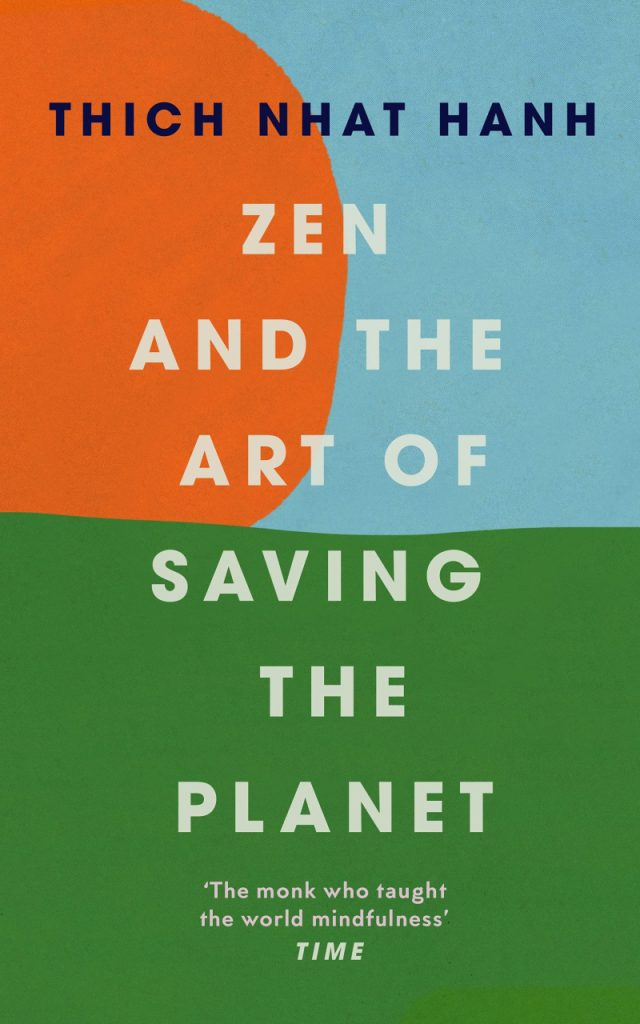
From the Vietnamese monk who brought the idea of mindfulness to the Western world, this book brings together a collection of Thich Nhat Hanh’s writings on the relation between humans and their environment. He’s keenly aware of the impact that environmental destruction and climate change can have on our mental health, and he provides some key ways in which mindfulness and meditation can help us to overcome these difficulties.
The spiritual path is not for everyone, but for many of us who feel some kind of relationship with nature, learning new ways of relating and being is a meaningful and oftentimes rewarding task. Learning the true insight of interbeing, and the interconnectedness of all beings, is an important part of the scientific findings from ecology as well as the spiritual and ethical pathways. We see that in fact, both point to the same conclusion: we are earth, we are nature, and by looking after ourselves better, we are better able to look after others, and look after the environment, too.
Part of this pathway is learning that it is in our nature, and the nature of all living things, to change – to be born, to change in life, and to die again. Non-attachment to views, to particular ways of doing things, and to particular forms of life, is a key part of the Buddhist belief system. However, this is often criticised by non-Buddhists, and some Buddhists, for leading to some kind of apathy – we should not care because everything will change, and we are just passing through like all other beings. This, however, is a mistaken way to view things. If we realise that we too are part of this universe like all other beings, we realise that we cannot hold onto anything like all other species, but we can care for and look after all beings to reduce our, and their suffering. By reducing our collective suffering, our changeable time here on earth becomes pleasurable and peaceful, rather than violent and difficult.
The book is filled with practical mindfulness methods, as well as examples from both Thich Nhat Hanh and his community of practitioners. These examples show us that it is possible to put to use these tips and pieces of advice from Buddhism, and that a peaceful and considerate route does work and can make a difference. Sometimes speaking the truth from a place of calm and respect does wonders to help others listen and respect our point of view.
On the other hand, listening to those who think differently to us is equally important. We have to understand what is going on in their lives and why they think what they do, if we have any chance of introducing them to ecological ways of thinking and being.
This book is easy to read and highly engaging, and will definitely inspire readers to add some moments of mindfulness to their daily practice, if they don’t already have these. Meditation is a good place to start, but even just taking the time to sit and be with ourselves and accept the emotional rollercoaster that we are on is a great way to understand who we are and the true nature of our relationship with the environment.
Zen and the Art of Saving the Planet is available at Paper Plus NZ here, or check out your local bookshop to see if they have it in stock or can order it for you.
It took more than 30 hours of research and writing to produce this article, which will always be open and free for everyone to read, without any advertising.
All our articles are freely accessible because we believe that everyone needs to be able to access to a source of coherent and easy to understand information on the ecological crisis. This challenge that confronts us all will only be properly addressed when we understand what the problems are and where they come from.
If you've learned something today, please consider donating, to help us produce more great articles and share this knowledge with a wider audience.
Why plurality.eco?
Our environment is more than a resource to be exploited. Human beings are not the ‘masters of nature,’ and cannot think they are managers of everything around them. Plurality is about finding a wealth of ideas to help us cope with the ecological crisis which we have to confront now, and in the coming decades. We all need to understand what is at stake, and create new ways of being in the world, new dreams for ourselves, that recognise this uncertain future.
Copyright © Plurality.eco 2023
Tree Sense – Susette Goldsmith
author
Jacques Lawinski
post
- 15/02/2023
- No Comments
- Reviews
share
Tree Sense: Ways of thinking about trees, edited by Susette Goldsmith.
Massey University Press, 2021.
A compilation of ways in which we can think about, value, and explore the trees that form, and are themselves formed by our beautiful landscapes in Aotearoa New Zealand.
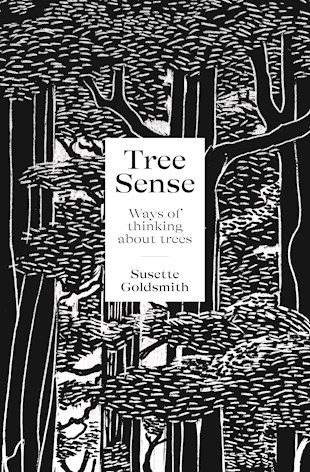
Goldsmith has put together an impressive collection of essays, stories, poetry, art, and literature from contemporary New Zealand writers and artists to understand our relationship with trees. The book is a wonderful compendium of different ways to think about, relate to, analyse, and value the trees that are in our backyards and neighbourhoods, but also the trees in our forests and protected lands.
Goldsmith tells the story of how New Zealand’s progress and development as a nation came at a cost: the destruction of a large part of New Zealand’s native plants and trees, the very things which enabled the landscape to be strong and maintain its structural integrity. This was done in favour of farmland, and because many trees were not, and still are not protected or considered valuable to human life and development. The dark side of development has not only been the loss of ecosystems precious to the country’s plants and animals, but also the slow erosion of the relationship with the natural world, that we still lack today.
A common theme in the book is the way in which trees can inspire us, and ways for us to look to trees for knowledge, behavioural conduct, and new ideas. “Think like a Mataī” is Colin D Meurk’s description of how trees could help us, and he concludes by recognising the need to think more like these strong native trees. Likewise, Kennedy Warne discusses the place of trees in whakapapa genealogical relations, which are important to tikanga Māori and the way in which Māori relate to the environment.
Glyn Church’s “The peculiar trees of Aotearoa” appealed particularly to me, but each reader will find something different which piques their interest and gently encourages them out of the house and onto the land. I didn’t realise just how unique the tree species native to New Zealand are, and, growing up among these trees, how the landscape has shaped and formed them just as much as they now shape the landscape.
Thoroughly recommended to anyone with an interest in trees and plants in New Zealand. It’s something that can be read cover to cover, but also by reading random chapters at times when we feel we need some inspiration from the trees, and a new way to look out of our windows and into the natural world.
Tree Sense is available at Paper Plus NZ here, or check out your local bookshop to see if they have it in stock or can order it for you.
It took more than 30 hours of research and writing to produce this article, which will always be open and free for everyone to read, without any advertising.
All our articles are freely accessible because we believe that everyone needs to be able to access to a source of coherent and easy to understand information on the ecological crisis. This challenge that confronts us all will only be properly addressed when we understand what the problems are and where they come from.
If you've learned something today, please consider donating, to help us produce more great articles and share this knowledge with a wider audience.
Why plurality.eco?
Our environment is more than a resource to be exploited. Human beings are not the ‘masters of nature,’ and cannot think they are managers of everything around them. Plurality is about finding a wealth of ideas to help us cope with the ecological crisis which we have to confront now, and in the coming decades. We all need to understand what is at stake, and create new ways of being in the world, new dreams for ourselves, that recognise this uncertain future.
Copyright © Plurality.eco 2023
English Pastoral – James Rebanks
author
Jacques Lawinski
post
- 12/02/2023
- No Comments
- Reviews
share
English Pastoral: An Inheritance by James Rebanks
Penguin Random House, 2021.
A personal story of a farmer faced with industrialisation and modernisation in the world of farming, and how he is continuing to farm, determined to do good for the land.
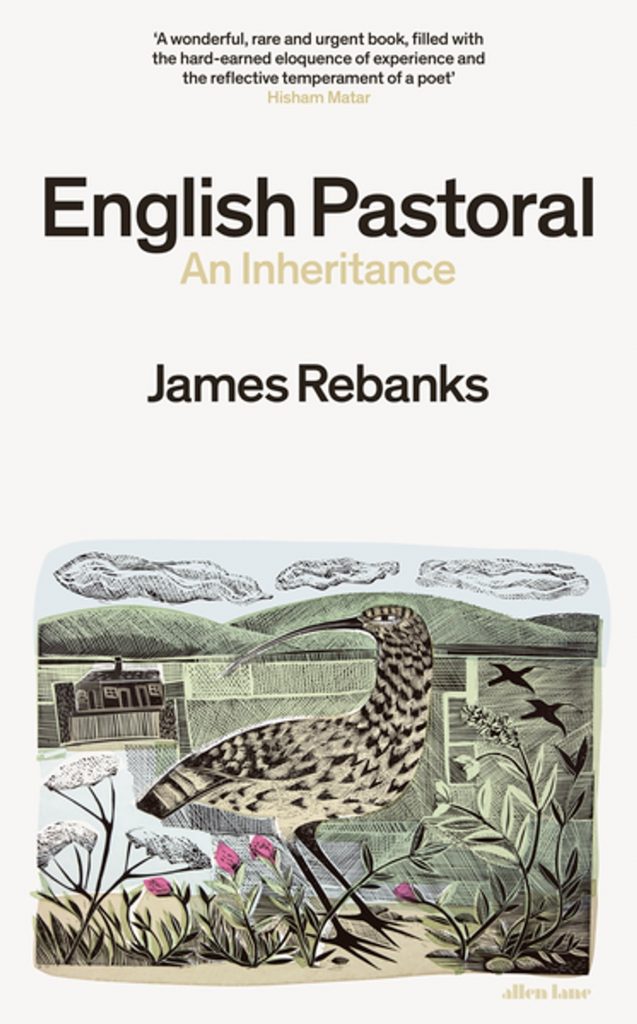
In this widely popular book in the UK, James Rebanks explores what it means to be a farmer, and the changes that have taken place to implement an industrial farming system, supressing traditional methods. He’s open, honest and frank about the emotions regularly experienced by farmers who have gone through this conversion, including regret, sadness, and doubt, but also pride, fulfillment, and a sense of mastery and status.
The book intertwines personal stories on the farm that Rebanks has in England, with information about the ecological impact of farming methods, and the ways in which we have destroyed the environment. He is quick to point the supermarkets out as key players in a systemic problem, noting that the price wars and demands for low-cost food mean that farmers have little choice but to industrialise, and in turn destroy their land. He writes of the plan to modernise and increase the efficiency of farming through new technologies: “There is a big problem with this plan. The new super-industrial farming isn’t sustainable – it is the most destructive farming on earth in both climate and ecological terms.”
The problems that Rebanks points out are multiple and involve everyone, however, and not just the supermarkets. Farmers and consumers are also playing a large role in supporting this system, but this is often due to a lack of information and knowledge about the impact of their decisions: “Most people are now largely illiterate when it comes to agriculture and ecology. This is a cultural disaster, because the global challenge of how we live sustainably on this planet is really a local challenge.”
It’s a local challenge because Rebanks’ utopic vision involves everyone having a close relationship with the food that nourishes them, and therefore the land that grows this food. It’s certainly important, but just how feasible is it, given the mega-cities that we are constructing, with an incredibly high density of people? We might imagine small villages and towns having a closer relationship to their food, but some large-scale structural changes are needed to really confront the problem.
He believes we have listened to economists for too long now, to the detriment of our farms, and our farmers. Industrialising our farming systems meant that “The pigs, chickens or cows in those giant sheds didn’t exist as individuals and had become more like a crop, a mass-produced entity generating a ‘yield’. Perhaps it didn’t matter to most people, but I found it unsettling and alien.”
Relationships with the land and the nourishment that this land provides are key to confronting the ecological crisis. Rebanks’ discussion of converting his farm to regenerative agricultural methods and using traditional mixed and rotational crops and grazing farming has meant more human work is needed on the farm. It’s also meant that he has to go out and earn money in other ways, too, which is a reality for many farmers: keep up or die out. Diversification seems to be working for him, but just how many farmers are willing to take that risk? Hopefully our New Zealand farmers also read Rebanks’ work, and think about their own stories and emotions regarding their land, and how they, and we, might work together to reduce the impact our agricultural systems are having on the land.
English Pastoral is available at Paper Plus NZ here, or check out your local bookshop to see if they have it in stock or can order it for you.
It took more than 30 hours of research and writing to produce this article, which will always be open and free for everyone to read, without any advertising.
All our articles are freely accessible because we believe that everyone needs to be able to access to a source of coherent and easy to understand information on the ecological crisis. This challenge that confronts us all will only be properly addressed when we understand what the problems are and where they come from.
If you've learned something today, please consider donating, to help us produce more great articles and share this knowledge with a wider audience.
Why plurality.eco?
Our environment is more than a resource to be exploited. Human beings are not the ‘masters of nature,’ and cannot think they are managers of everything around them. Plurality is about finding a wealth of ideas to help us cope with the ecological crisis which we have to confront now, and in the coming decades. We all need to understand what is at stake, and create new ways of being in the world, new dreams for ourselves, that recognise this uncertain future.
Copyright © Plurality.eco 2023
Aroha – Hinemoa Elder
author
Jacques Lawinski
post
- 02/01/2023
- No Comments
- Reviews
share
AROHA: Māori wisdom for a contented life lived in harmony with our planet by Dr. Hinemoa Elder
Ebury Press/Penguin Random House, 2020.
An honest and open discussion of our relationship with nature through whakataukī – proverbs, in Te Reo Māori
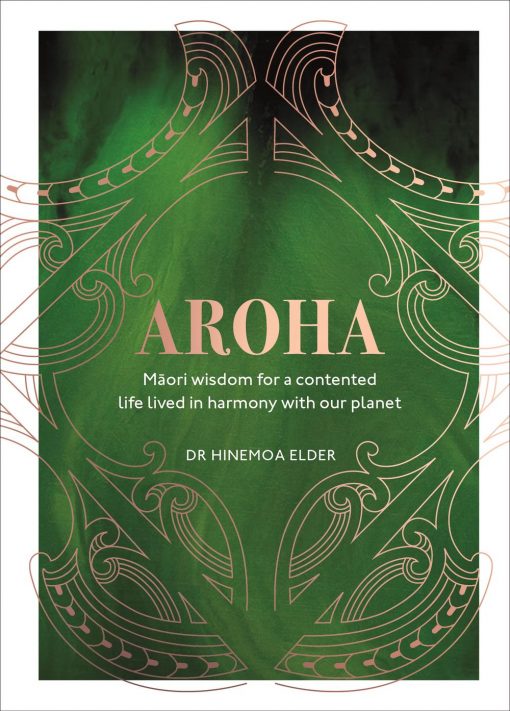
Dr Hinemoa Elder is one of New Zealand’s most prominent academics and writers on te ao Māori, having published several books which both explore her own relationship with the Maori world, as well as introducing us as readers to Māori ways of thinking. Aroha is no different; through many whakataukī (Māori proverbs), we understand how important harmony with nature is to Māori.
The first whakatauki in the book is “Tūwhitia te hopo!” – banish your fears! A great start to look at the challenges and nuances that Elder will bring in throughout the book. Hopo, in Māori, she explains, does not just mean fear, but also “trepidation, a sinking feeling of dread.” We express emotions differently in different cultures, and Elder uses this to start a conversation about how we express our emotions, reminding us to reflect on this, and be brave when sharing who we are, because this opens up new opportunities for connection.
Sometimes Elder asks us some very deep and personal questions. It’s easy to think, “well that’s a question I’ve got, so what’s the answer!?” Elder doesn’t provide us with answers, but through the whakataukī we can develop wisdom which will lead us to the answers we seek. By thinking about why Māori use these words to express a particular saying, we can understand connections and relationships that were previously unclear to us. This can help us to answer these tough questions.
As this is a book of phrases, you could read this a couple of pages per day, focusing on one whakataukī per day to inspire your day, or you could just read it as you would any other book, and stop when you’ve found a great whakataukī which you want to meditate on further. Or, if you’re not the type for reading books often, you could open it to a random page each time you remember that the book exists! However you choose to read it, this little green book will certainly remain in your thoughts for some time to come.
AROHA: Māori wisdom for a contented life lived in harmony with our planet by Dr. Hinemoa Elder is available from Paper Plus NZ here. Otherwise, check out your local bookshop and see if they have it in stock or can order it for you.
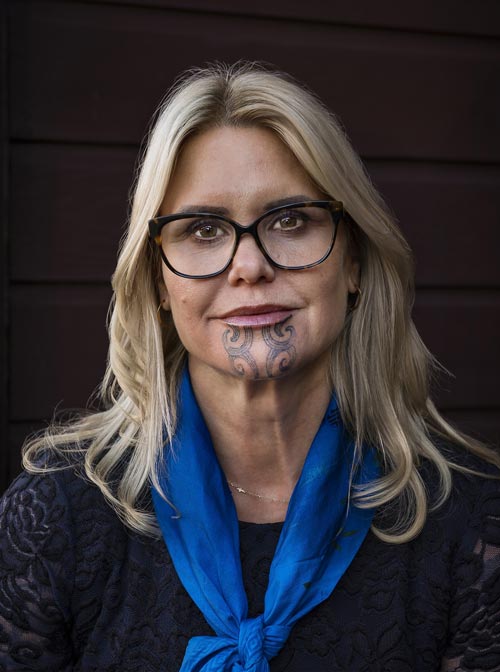
It took more than 30 hours of research and writing to produce this article, which will always be open and free for everyone to read, without any advertising.
All our articles are freely accessible because we believe that everyone needs to be able to access to a source of coherent and easy to understand information on the ecological crisis. This challenge that confronts us all will only be properly addressed when we understand what the problems are and where they come from.
If you've learned something today, please consider donating, to help us produce more great articles and share this knowledge with a wider audience.
Why plurality.eco?
Our environment is more than a resource to be exploited. Human beings are not the ‘masters of nature,’ and cannot think they are managers of everything around them. Plurality is about finding a wealth of ideas to help us cope with the ecological crisis which we have to confront now, and in the coming decades. We all need to understand what is at stake, and create new ways of being in the world, new dreams for ourselves, that recognise this uncertain future.
Copyright © Plurality.eco 2023
Living by the Moon – Wiremu Tāwhai
author
Jacques Lawinski
post
- 02/01/2023
- No Comments
- Reviews
share
LIVING BY THE MOON: TE MARAMATAKA A TE WHĀNAU-Ā-APANUI by Wiremu Tāwhai
Huia Publishers, first published in 2015.
A beautiful bilingual work in both Te Reo Māori and English, this is the guide to maramataka for anyone interested in learning more about te ao Māori.
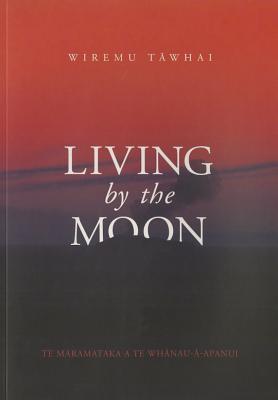
Wiremu Tāwhai’s final work before his death in 2010, this small but powerful book covers his iwi’s (tribe’s) traditional knowledge about the moon cycles, maramataka. In te ao Māori (the Māori world), the moon is the natural force which was tracked in order to locate the people in time (seasons, months, etc.), but also the force which determined what the conditions for life would be like in the coming month, such as the gardening conditions, fishing conditions, and eeling opportunities. The moon also played a role in emotions and relationships. It is thus that Māori saw that there was a ‘right time’ to do each thing, according to the phases of the moon.
Each time we see the moon – every night – we enter into a different phase. The phases have either high, low, or neutral energy, and then have different corresponding behaviours for the ocean, the people, the gardens, and the animals. Tāwhai talks to kaumātua of his tribe, and to many others around the country, to assemble as much dispersed knowledge as he can about each phase, in order to write a couple of pages for each day of the lunar cycle. We learn about gardening conditions such as when it’s a good time to plant, or to weed, as well as fishing and eeling conditions (including what the fish will be like if we try to catch them on a particular day).
I started reading the book in the Tamatea phase, where the ocean is churning itself up, renewal is on the horizon, and swimming and fishing exploits should be avoided. I found myself looking at the ocean each day as I went past, remarking that yes, in fact, it was quite rough, and it had indeed settled down after the Tamatea period finished. As someone who grew up within the Western knowledge systems, the need to verify what we learn is a necessary habit. Tāwhai knows this, and emphasises the fact that this knowledge is not unchanging; rather, each generation will test it and add to it, developing and modifying the nature of each cycle according to their own conditions. This is a practical and action-based guide to a knowledge system developed and refined over hundreds of years of living in Aotearoa.
Tāwhai has written a beautiful introduction to the book, showing how the knowledge is grounded in tradition, and introducing us the hands who hold this knowledge, and how it is transmitted between people. We learn about the risks of this knowledge disappearing, and the motivations behind writing this book.
A fascinating read for anyone who thinks they have a close relationship with ‘nature’. You might just learn a little more about how this ‘nature’ influences you, and how you can better organise your life according to these moon cycles. Weeds won’t grow back after a few hours, and kumara will be plentiful!
Living by the Moon: Te Maramataka a te Whānau-ā-Apanui by Wiremu Tāwhai is available from Paper Plus NZ here. Otherwise, check out your local bookshop to see if they have it in stock or can order it in for you.
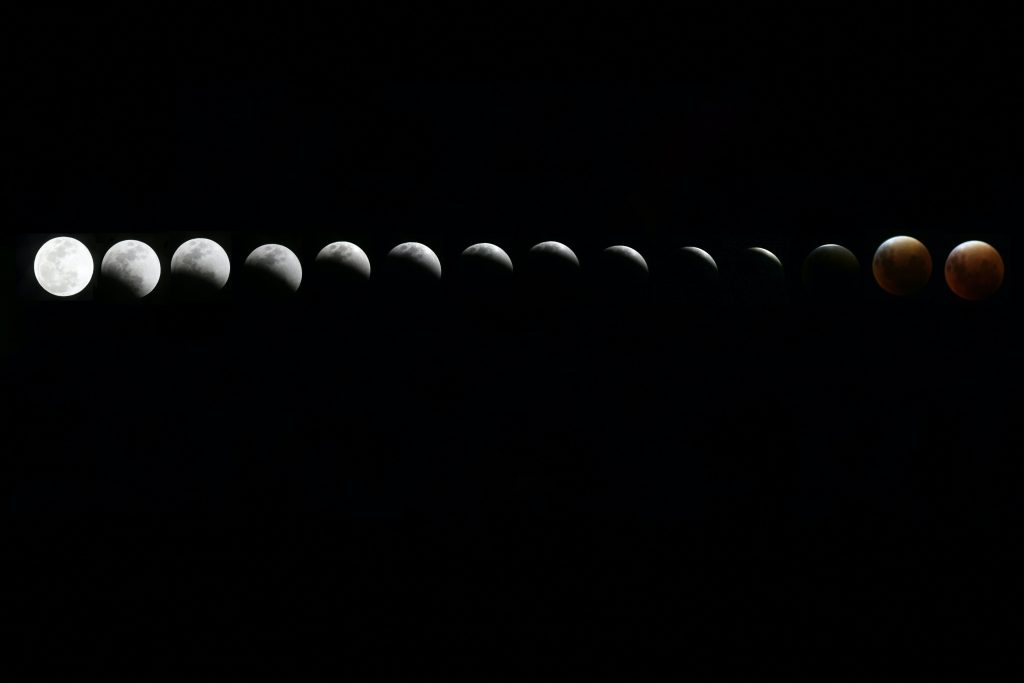
It took more than 30 hours of research and writing to produce this article, which will always be open and free for everyone to read, without any advertising.
All our articles are freely accessible because we believe that everyone needs to be able to access to a source of coherent and easy to understand information on the ecological crisis. This challenge that confronts us all will only be properly addressed when we understand what the problems are and where they come from.
If you've learned something today, please consider donating, to help us produce more great articles and share this knowledge with a wider audience.
Why plurality.eco?
Our environment is more than a resource to be exploited. Human beings are not the ‘masters of nature,’ and cannot think they are managers of everything around them. Plurality is about finding a wealth of ideas to help us cope with the ecological crisis which we have to confront now, and in the coming decades. We all need to understand what is at stake, and create new ways of being in the world, new dreams for ourselves, that recognise this uncertain future.
Copyright © Plurality.eco 2023
Gone Bush – Paul Kilgour
author
Jacques Lawinski
post
- 31/12/2022
- No Comments
- Reviews
share
GONE BUSH by Paul Kilgour
Harper Collins Publishers, 2021.
Easy summer read, great for a couple of sunny afternoons at the beach.
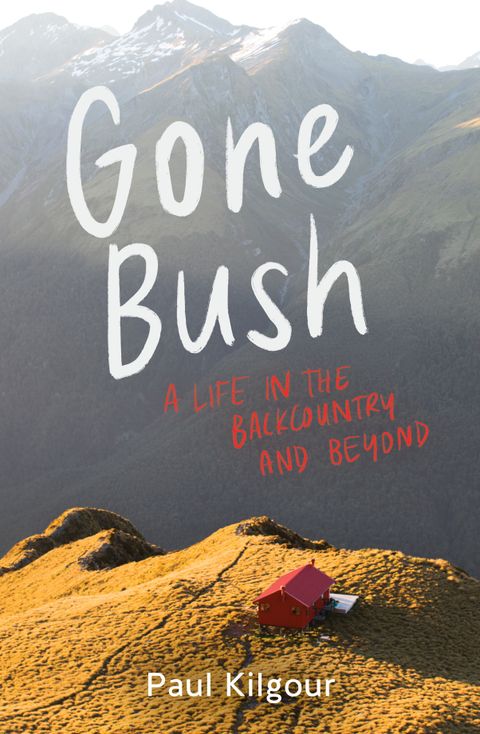
Gone Bush is Paul Kilgour’s memoir to his many years in the back country of New Zealand. He recounts the stories of how he’s “bagged” (slept in) at least 1208 huts in both New Zealand and overseas. He’s also written a good section about his tramp from Puysegur Point at the bottom of the South Island, to Golden Bay at the top of the South Island where he lives.
Paul writes with honesty and friendliness, and opens up to us about both the exhilarating parts of tramping through the country, but also the struggles, the tribulations, and the things that have changed both for him, and for the country he’s walked through. Traversing the mountains with Paul as he recounts the characters he’s met along the way, and the incredible hospitality of New Zealanders, offers a meditative insider’s look into what it’s like to be walking for days on end.
Kilgour reflects on what’s changed in New Zealand throughout his time tramping. One of the most notable changes, and one change that is sad to hear, is that the old tramping days are over. By this, he means being made welcome by the farmhouses and those living along the routes, easily crossing private land, and a sense of collegiality and belonging between fellow trampers and hunters, who would leave food and supplies in the huts they visited for the next group that came.
Tramping has become a more “mainstream” activity, meaning that many more people are taking part, which is great for them, and for our collective experiences in the wilderness of New Zealand. However, Kilgour expresses an emotion which I think many of us who explore the outdoors often feel – righteousness at these places being ours, and disappointment when other people are there to ‘spoil’ our aloneness. It can be difficult to see that more people experiencing the back country of New Zealand is a good thing, especially when some of them can be disrespectful, leave rubbish everywhere, and aren’t interested in carrying on the tramping collegiality of which Kilgour speaks.
As well as telling some great stories, Kilgour reminds us to reflect on the motivations for us going out into the bush, and inspires us to keep the sense of community alive through the continuation of small traditions among fellow trampers.
Gone Bush by Paul Kilgour is available from Paper Plus NZ here. Otherwise, check out your local bookshop to see if they have it in stock or can order it for you.

It took more than 30 hours of research and writing to produce this article, which will always be open and free for everyone to read, without any advertising.
All our articles are freely accessible because we believe that everyone needs to be able to access to a source of coherent and easy to understand information on the ecological crisis. This challenge that confronts us all will only be properly addressed when we understand what the problems are and where they come from.
If you've learned something today, please consider donating, to help us produce more great articles and share this knowledge with a wider audience.
Why plurality.eco?
Our environment is more than a resource to be exploited. Human beings are not the ‘masters of nature,’ and cannot think they are managers of everything around them. Plurality is about finding a wealth of ideas to help us cope with the ecological crisis which we have to confront now, and in the coming decades. We all need to understand what is at stake, and create new ways of being in the world, new dreams for ourselves, that recognise this uncertain future.
Copyright © Plurality.eco 2023



